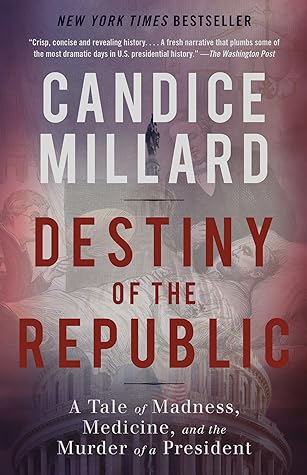More on this book
Community
Kindle Notes & Highlights
Read between
November 10 - November 27, 2017
Bliss would later recall that, throughout Garfield’s illness, he “never approached him without meeting an extended hand, and an expression of thankful recognition of the efforts being made for his comfort and recovery.” Each time, after the doctors had dressed his wounds, a long and painful daily process, Garfield would always say, in a hearty voice, “Thank you, gentlemen.”
There is no horizontal Stratification of society in this country like the rocks in the earth, that hold one class down below forevermore, and let another come to the surface to stay there forever. Our Stratification is like the ocean, where every individual drop is free to move, and where from the sternest depths of the mighty deep any drop may come up to glitter on the highest wave that rolls. JAMES A. GARFIELD
A nation of immigrants, the United States found in Garfield a president who knew well the brutal indignities of poverty, and the struggle to overcome them.
In the West, those Americans who had endured the perils and hardship of the frontier to find a better life knew Garfield not only as a child of poverty but as the son of pioneers.
For freed slaves, an impoverished and, until recently, almost entirely powerless segment of the population, Garfield represented freedom and progress, but also, and perhaps more importantly, dignity.
“You were not made free merely to be allowed to vote, but in order to enjoy an equality of opportunity in the race of life,” Garfield had told a delegation of 250 black men just before he was elected president. “Permit no man to praise you because you are black, nor wrong you because you are black. Let it be known that you are ready and willing to work out your own material salvation by your own energy, your own worth, your own labor.”
Even in the South, where he had once been hated and feared as an abolitionist and Union general, there was a surprising pride in Garfield’s presidency. Although he had made it clear from the moment he took office, even in his inaugural address, that he would not tolerate the discrimination he knew was taking place in the South, what he promised was not judgment and vengeance but help.
Even Jefferson Davis, the former president of the Confederacy and a man whom Garfield had voted to indict as a war criminal, admitted that the assassination attempt had made “the whole Nation kin.”
Arthur not only read Sand’s letters, he kept them. Over the years, he would keep twenty-three of her letters, each one urging him to be a better man than he had once believed he could be.
“It is not the proof of highest goodness never to have done wrong,” Sand assured him, “but it is a proof of it … to recognize the evil, to turn resolutely against it.”
have sometimes thought that we cannot know any man thoroughly well while he is in perfect health. As the ebb-tide discloses the real lines of the shore and the bed of the sea, so feebleness, sickness, and pain bring out the real character of a man. JAMES A. GARFIELD
A few years after Garfield’s death, a reporter, gazing at a formal portrait of him that hung in the White House, wrote, “I fear coming generations of visitors who pass through this grand corridor will see nothing in the stern, sad face of Garfield to remind them that here was a man who loved to play croquet and romp with his boys upon his lawn at Mentor, who read Tennyson and Longfellow at fifty with as much enthusiastic pleasure as at twenty, who walked at evening with his arm around the neck of a friend in affectionate conversation, and whose sweet, sunny, loving nature not even twenty years
...more
the day Garfield’s death was announced, when his countrymen mourned not as northerners or southerners, but as Americans.
The day McKinley was shot—he would die from his wounds eight days later—Robert Todd Lincoln was once again standing with the president, thus earning the dubious distinction of being the only man to be present at three of our nation’s four presidential assassinations.
To Americans in 1881, the principal danger their presidents faced was not physical attack but political corruption. With a determination that shocked even the most senior politicians, they turned their wrath on the spoils system,
Lucretia’s first concern, however, was for her husband’s papers. She asked Joseph Stanley Brown for his help in organizing them, and she used some of the money from the fund that had been established for her to build an addition to the farmhouse. The second floor of this wing was made into a library, which would become the nation’s first presidential library.
Bell, still a young man, had an astonishingly busy and productive life yet ahead of him. Soon after Garfield’s death, he would become a United States citizen. In 1888, he and a small group of like-minded men would found the National Geographic Society,


